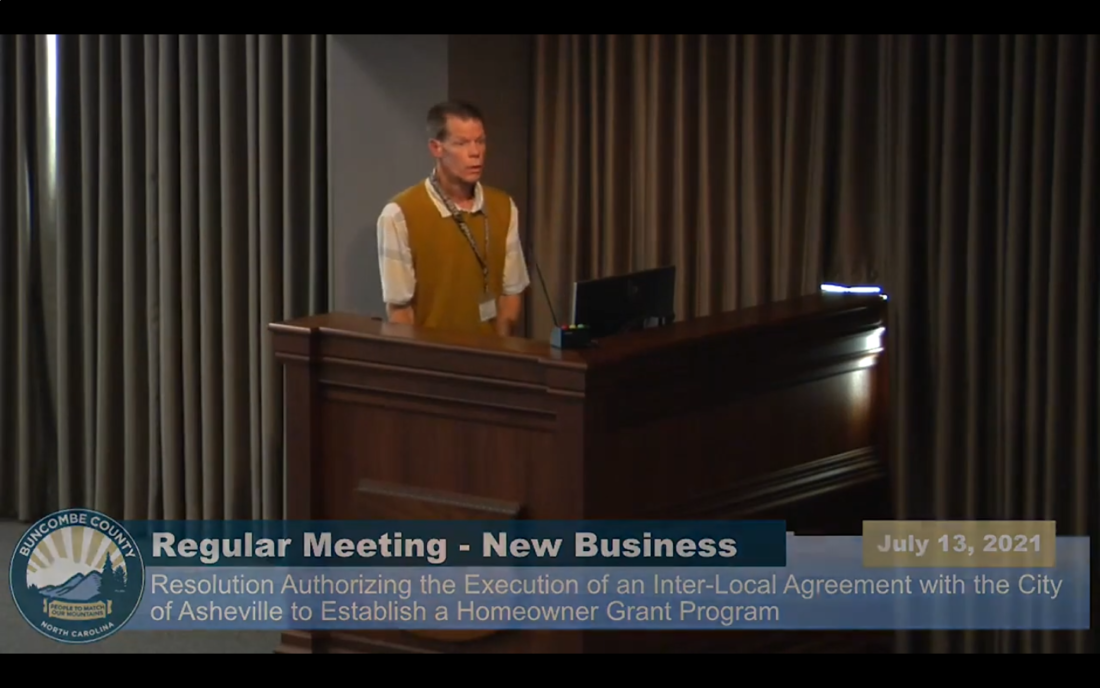Along with their 2021 property tax bills, Buncombe County homeowners will receive notice of a new initiative that could offer some relief. During a July 13 meeting, the county Board of Commissioners unanimously approved the terms of a grant program that would offer up to $300 to eligible low-income homeowners impacted by rising taxes.
As explained by Phillip Hardin, Buncombe’s economic services director, residents who have owned their primary residence for at least five years and make no more than 80% of the area median income — $60,100 for a family of four — could apply for aid starting Sunday, Aug. 1. Grant amounts would be tied to the increase on a homeowner’s property tax bill, which Hardin said fell between $200 and $300 for the majority of county residents.
The $300 cap is lower than the $1,000 limit floated by Hardin during a June 15 briefing to the board. The residency requirement is also quintuple the initial proposal of one year. He said the lower boundary on aid would align the grants more closely with other county assistance programs.
Funding for the grants will come from a $300,000 allocation included in the county’s fiscal year 2021-22 budget. The city of Asheville has also designated $150,000 for a parallel program in its own budget, which is tentatively slated to offer grants of up to $200 to cover increases on city property taxes. Increases in supplemental city school or county fire district taxes are not covered by the program.
Brownie Newman, the board’s Democratic chair, said the grants were “a new idea for our community” and that the county would thoroughly evaluate the results after the program’s first year. “Some other places have tried to do some things to provide some financial relief for folks in parts of the state that have seen the cost of living go up for a variety of reasons in significant ways, and they haven’t worked out that well,” he added.
Buncombe spokesperson Lillian Govus said in a press release that further information on the program would be forthcoming on the county’s website. The deadline for grant applications will be Monday, Nov. 15.
$40K incentive approved for East Fork Pottery
In another unanimous decision, the board voted to award a $40,000 economic development incentive to East Fork Pottery, an Asheville-based home goods company. The business is embarking on a more than $2.8 million expansion of its manufacturing facilities and plans to hire 50 new employees at an average wage of $22.46 per hour.
Alex Matisse, East Fork’s chief strategy officer and board chair, said the company plans to add automated equipment that will triple its production capacity to roughly 1 million pieces of dinnerware per year. The expansion is scheduled for completion by January.
Democratic Commissioner Al Whitesides called the deal “one of the best economic incentive programs I’ve seen,” with particular praise for East Fork’s focus on socially and racially inclusive hiring. “This will help us start to get rid of systemic racism, because that’s where it starts: with employment,” he said.




Racist democrat commissioner Al Whitesides has to comment, of course.
And so does Fred “Fisher” Caudle, apparently. Of the two of you, how many have had the guts to run for office?
An already weak program has been diluted further till it’s almost a homeopathic remedy. The households that would benefit most from grants are going to be the ones least likely to be made aware of them in a timely way or jump through the various hoops that the county has set up for them to qualify.
As the saying goes, “a program that deals only with the poor will end up being a poor program.” This isn’t a program for the poor per se: it’s more for asset rich[er] and cash poor[er] households, not for renters whose landlords will simply pass on the increase. However, a means-tested program that will help a couple thousand households at best won’t make up for the county and city getting greedy with the pandemic boom in house prices while the local economy is still finding its feet.
I’ll predict now that the funds will be exhausted within a few weeks and the majority of recipients will be households near the top end of the income threshold. When that happens, it’ll be time to put in a public records request for (anonymized) data on the number of grants issued, qualifying incomes, and amount received.
Unless I’m mistaken, this program is to help people who are genuinely hurt by a 300 dollar tax increase. Shouldn’t the tax relief begin with those at the lower end of the income scale, especially since there is a finite amount of money allocated. Technically I am eligible for the program, being retired and on social security, but I believe the essence of the program is to help the poor. I will not apply.
It appears that Asheville is going broke.
It appears that Buncombe County is going broke.
Does it, though?